Product
When it comes to Flippa for Selling Websites, setting the right price is crucial for attracting buyers and securing a profitable deal. Websites on Flippa can range from small starter sites to high-value businesses, and understanding where your site fits in the market can help you maximize your sale.
In this guide, we’ll compare low, mid, and high-end website valuations, exploring how factors like revenue, traffic, and scalability impact pricing. Whether you’re selling a blog, an eCommerce store, or a SaaS business, knowing the right pricing strategy will help you stand out and sell successfully on Flippa for Selling Websites.ntro (Paragraph)
Why Choose Flippa for Selling Websites?
Flippa is one of the most popular platforms for selling websites on Flippa, offering a vast marketplace with buyers from around the world. Here are the key reasons why Flippa stands out as the go-to choice for website sales.
1. Largest Marketplace for Website Sales
Flippa has a massive audience of investors, entrepreneurs, and businesses looking to buy digital assets. This means your website gets high visibility and a greater chance of selling quickly.

2. Access to Global Buyers
Unlike other platforms that may have a limited audience, Flippa connects you with international buyers. This increases competition for your listing, often leading to higher selling prices.

3. Transparency and Trust
Using Flippa for Selling Websites comes with built-in tools like verified revenue reports, Google Analytics integration, and escrow services, ensuring safe and transparent transactions. This level of security makes buyers more confident in purchasing your website, increasing your chances of a successful sale.
4. User-Friendly Selling Process
One of the biggest advantages of Flippa for Selling Websites is its simple and streamlined selling process. The platform guides you through every step—from creating a compelling listing to setting the right price, marketing your website, and finalizing the sale. Even if you’re new to website flipping, Flippa makes it easy to navigate and succeed.
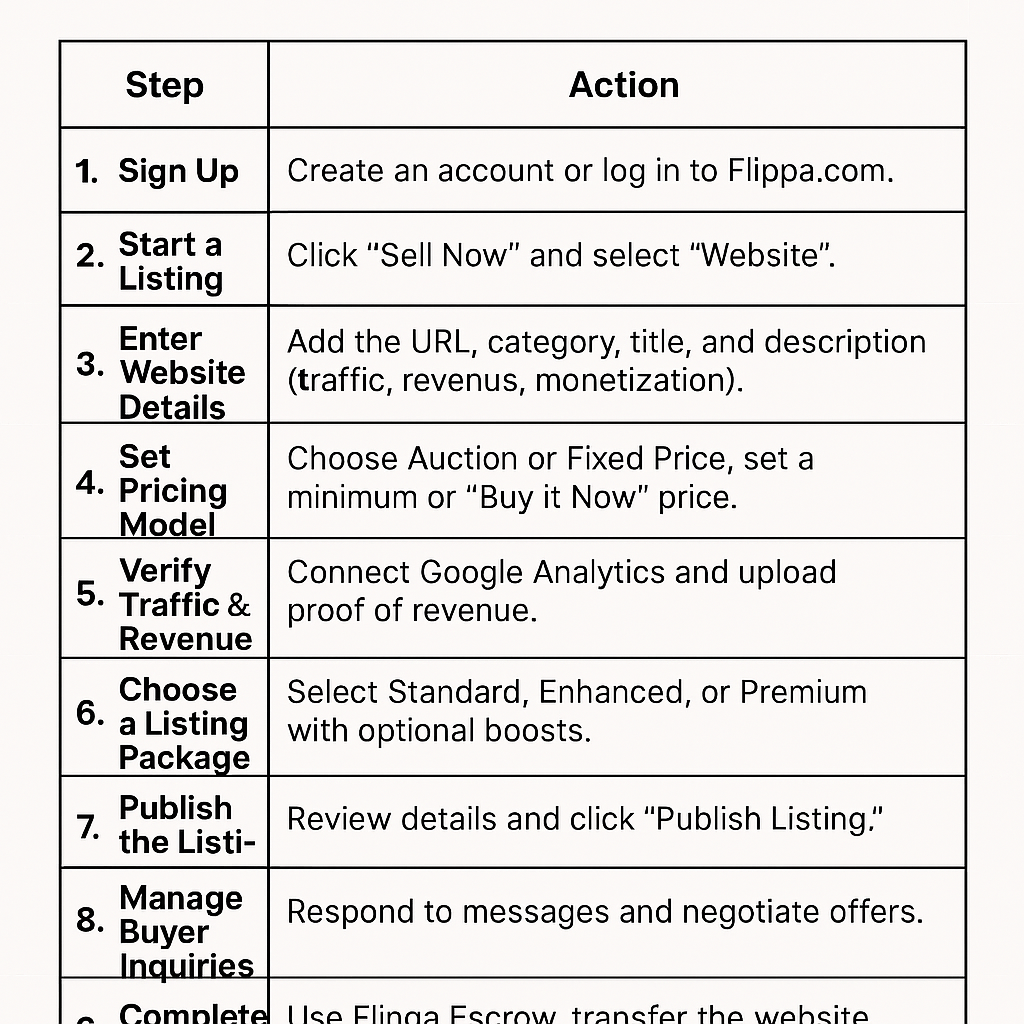
5. Auction and Direct Sale Options
Flippa offers flexibility in how you sell your website. You can either:
- List it as an auction, attracting multiple bidders.
- Set a fixed price for a direct sale.
This allows you to choose a selling strategy that maximizes your profit.
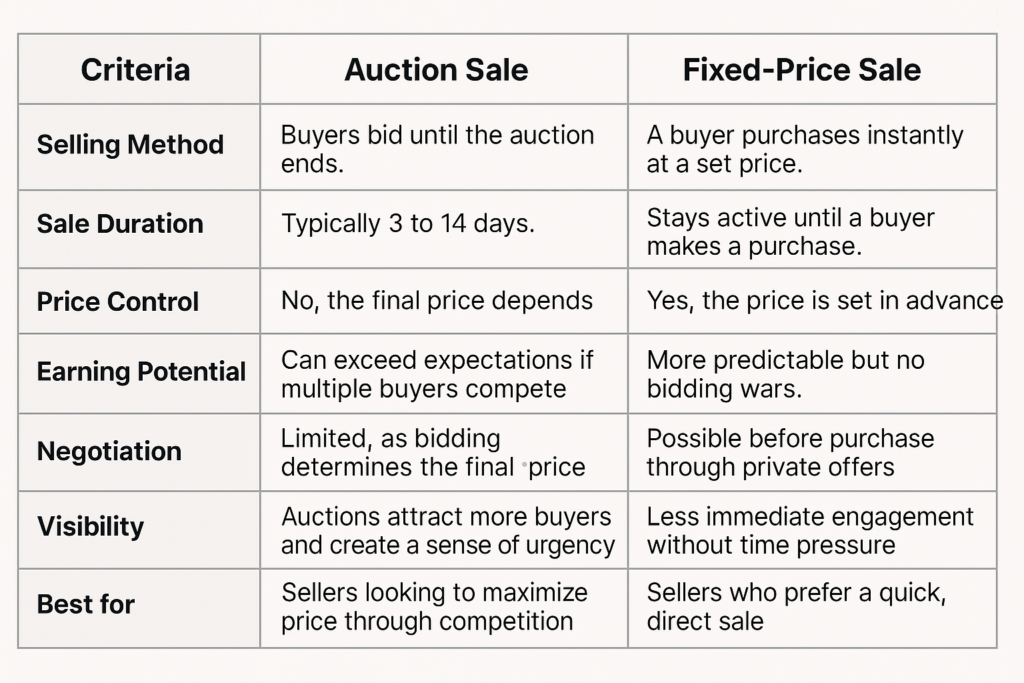
Final Thoughts
Flippa is a trusted, efficient, and profitable platform for selling websites. With a large buyer base, secure transactions, and an easy listing process, it’s the best marketplace for maximizing your website’s value.Preparing Your Website for Sale
Before using Flippa for Selling Websites, you need to ensure your site is in the best possible shape. Buyers look for profitable, well-maintained websites, so preparing properly can help you attract higher bids and sell faster.
1. Evaluate Your Website’s Value
The first step in successfully using Flippa for Selling Websites is determining how much your website is worth. Several key factors influence website valuation, including:
- Revenue & Profitability – How much money does your site generate monthly?
- Traffic & Audience – Where does your traffic come from? Is it organic, paid, or referral?
- Niche & Market Demand – Some niches, like finance or e-commerce, attract higher valuations.
By understanding these factors, you can set a competitive price and position your website for a successful sale on Flippa for Selling Websites.
| Factor | Impact on Valuation |
|---|---|
| Revenue & Profitability | Higher monthly revenue & profit margins increase valuation. |
| Traffic & Audience | More unique visitors, stable traffic sources, and high engagement boost value. |
| Monetization Model | Websites with recurring revenue (subscriptions, SaaS) tend to be valued higher. |
| Domain & Branding | Aged domains, strong branding, and trademarks improve desirability. |
| Website Niche & Market Demand | Trending or evergreen niches with strong demand increase worth. |
| SEO & Backlinks | High domain authority (DA), organic rankings, and quality backlinks boost value. |
| Technical & Operational Aspects | Websites with low maintenance, automation, and scalability attract higher bids. |
| Social Media & Email List | Large, engaged followings and email subscriber lists add to website value. |
3. Clean Up Your Financials
On Flippa for Selling Websites, buyers want clear proof of earnings, so organizing financial records is essential:
- Prepare a detailed revenue and expense report (monthly breakdown).
- Provide access to Google Analytics and ad revenue dashboards.
- Ensure you have clean and verifiable payment records (PayPal, Stripe, etc.).

4. Strengthen SEO & Traffic Sources
A strong SEO and traffic strategy helps websites sell faster on Flippa for Selling Websites. Make sure your site:
- Shows consistent traffic growth (avoid sudden drops).
- Ranks for high-value keywords in its niche.
- Is free from black-hat SEO techniques (no spammy backlinks).
5. Document Website Operations
Serious buyers on Flippa for Selling Websites want a smooth transition. Prepare a handover guide that explains:
- How the website generates revenue.
- Daily, weekly, and monthly management tasks.
- Any necessary tools or software subscriptions.

Final Thoughts
A well-prepared website sells faster and for a higher price on Flippa for Selling Websites. By optimizing performance, organizing financials, and strengthening traffic, you increase your chances of getting top dollar when selling websites on Flippa.
Creating an Attractive Listing
When selling websites on Flippa for Selling Websites, your listing is the first impression buyers get. A compelling listing attracts more interest, drives higher bids, and brings in serious buyers. Here’s how to craft a listing that stands out.
1. Write a Clear and Engaging Title
Your title should instantly grab attention and highlight your website’s value. Keep it:
- Short and descriptive (avoid vague titles).
- Focused on key selling points (e.g., revenue, traffic, niche).
- Honest and transparent (buyers on Flippa value authenticity).
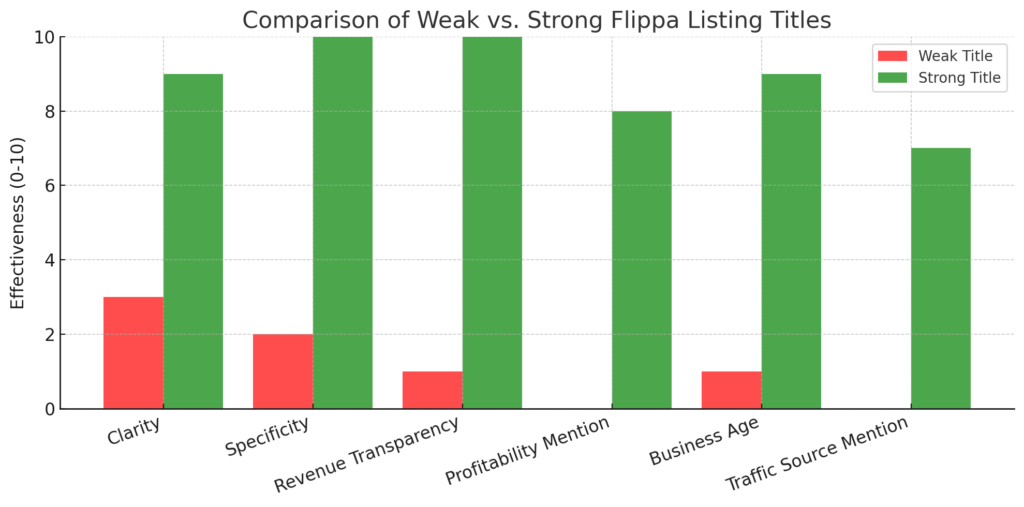
2. Craft a Compelling Description
Your description should give a detailed overview of your website, including:
- Website history – When was it launched, and how has it grown?
- Monetization methods – Does it earn from ads, affiliates, or product sales?
- Traffic sources – Organic, paid, social media, or referral?
- Reason for selling – Transparency builds trust with buyers.
3. Show Proof of Revenue and Traffic
Buyers on Flippa for Selling Websites want verifiable data before making an offer. Provide:
- Screenshots of earnings (Google AdSense, affiliate programs, or product sales).
- Google Analytics reports (traffic trends and audience demographics).
- Expense breakdowns to highlight profit margins.
Voici une maquette d’un rapport de trafic montrant la répartition des sources de trafic d’un site Web sur les 30 derniers jours. Les principales sources incluent la recherche organique, le trafic direct, les références, les réseaux sociaux et la publicité payante
By following these steps, you can maximize your listing’s visibility and attract the right buyers on Flippa for Selling Websites. 🚀 Google Analytics screenshot.
4. Set a Competitive Price
Pricing Your Website on Flippa for Selling Websites
Pricing your website correctly on Flippa for Selling Websites can increase buyer interest and maximize your sale price. Consider the following:
- Recent sales of similar websites on Flippa – Research past listings to gauge market trends.
- Multiples of monthly profit – Websites typically sell for 20-40x their monthly earnings.
- Auction vs. fixed price – Auctions can drive up bids, while fixed pricing offers stability and predictability.
| Critère | Enchères | Prix Fixe |
|---|
| Vitesse de Vente | Rapide (généralement 7-14 jours) | Peut prendre plus de temps |
| Prix Final | Dépend des enchères, peut être imprévisible | Contrôlé par le vendeur |
| Attrait pour les Acheteurs | Peut attirer plus d’acheteurs grâce à l’effet de rareté | Convient aux acheteurs qui veulent éviter la compétition |
| Flexibilité | Moins flexible, engagement à vendre au plus offrant | Flexible, possibilité de négocier avec les acheteurs |
| Risque | Le prix final peut être inférieur aux attentes | Moins risqué, surtout si bien évalué |
| Idéal pour | Sites très demandés ou avec un prix incertain | Sites établis avec une valeur claire |
5. Use High-Quality Screenshots and Media
Visuals play a crucial role when listing on Flippa for Selling Websites, making your offer more trustworthy and engaging. Upload:
- Website homepage screenshots to showcase design and layout.
- Earnings and traffic reports to provide credibility.
- A short video walkthrough explaining your website’s operations.

By implementing these strategies, you can boost buyer confidence, drive more bids, and increase your website’s value on Flippa for Selling Websites. 🚀
4oality screenshots.
Final Thoughts
A detailed, well-structured listing increases your chances of a successful sale when selling websites on Flippa. By writing a strong title, adding proof of revenue, and using high-quality visuals, you can attract serious buyers and get the best possible price for your website.
Pricing Strategies for Maximum Profit
Setting the right price is crucial when selling websites on Flippa. Price your site too high, and you may struggle to attract buyers. Price it too low, and you might leave money on the table. Here’s how to find the perfect balance to maximize your profit.
1. Understand Website Valuation
Before setting a price, determine how much your website is worth. The most common method is the monthly profit multiplier, which typically ranges from 20x to 40x monthly net profit.
For example:
- A website earning $500/month could sell for $10,000 – $20,000.
- A website earning $2,000/month could sell for $40,000 – $80,000.
2. Research Similar Website Sales
Check Flippa’s recently sold listings to see how similar websites were priced. Factors affecting valuation include:
- Niche popularity (finance, tech, and e-commerce sites tend to sell for more).
- Revenue consistency (stable income is more attractive than fluctuating earnings).
- Traffic sources (organic traffic is more valuable than paid traffic).

3. Choose Between Auction and Fixed Price
Flippa offers two main pricing models:
- Auction Listing
- Creates urgency and attracts multiple bids.
- Best for websites with strong demand.
- Risk: You might sell for less than expected.
- Fixed-Price Listing
- Ideal for sellers who know their site’s value.
- Allows negotiation with serious buyers.
- Risk: It may take longer to sell.
4. Use a Reserve Price for Auctions
If you choose an auction, set a reserve price (the minimum amount you’re willing to accept). This prevents your website from selling for less than its true value.
Example: If your website is worth $15,000, you might set a $12,000 reserve price to ensure a fair deal.
5. Consider Offering Seller Financing
If your website is high-value ($50,000+), some buyers may prefer to pay in installments rather than a lump sum. Offering financing can:
- Attract more buyers who may not have full funds upfront.
- Allow you to negotiate a higher final price.
- Spread your earnings over time for better cash flow.
Final Thoughts
The right pricing strategy ensures you get maximum value when selling websites on Flippa. Research similar sales, choose between auction or fixed pricing, and consider a reserve price or seller financing to increase your chances of a profitable and successful sale.
Marketing Your Flippa Listing
Creating a great listing is just the first step when selling websites on Flippa. To attract more buyers and get the best possible price, you need to actively promote your listing. Here’s how to maximize visibility and increase interest in your website sale.
1. Optimize Your Flippa Listing for Maximum Exposure
Flippa’s marketplace is competitive, so your listing needs to stand out. Make sure to:
- Use clear, high-quality images (screenshots of traffic, revenue, and website design).
- Write a compelling title and description highlighting your site’s best features.
- Add verified revenue and traffic reports to build trust with buyers.
2. Leverage Flippa’s Featured Listings
Using Flippa for Selling Websites, you can boost your listing’s visibility with paid promotions:
- Featured Listings – Appear at the top of search results, increasing exposure.
- Homepage Placement – Showcased on Flippa’s homepage, attracting serious buyers.
- Flippa Email Blast – Your listing is sent to a targeted audience of buyers.
These upgrades drive more traffic and engagement, leading to higher bids and faster sales.
3. Promote Your Listing on Social Media
Sharing your listing on social platforms helps attract more potential buyers. Focus on:
- LinkedIn – Ideal for attracting business buyers.
- Twitter/X – Engage with entrepreneurs and website investors.
- Facebook Groups – Join website flipping and digital asset communities.
Use engaging posts highlighting key selling points and include a direct link to your Flippa listing.
4. Reach Out to Your Email List
If you have an email list or newsletter subscribers, notify them that your website is for sale.
- They’re already familiar with your brand, making them more likely to buy.
- Offer an exclusive deal for interested subscribers.
5. List Your Website in Online Forums & Marketplaces
Besides Flippa for Selling Websites, promote your listing on other platforms:
- Reddit (r/Flipping, r/Entrepreneur) – Share your listing and answer buyer questions.
- Website flipping forums – Engage in discussions and mention your sale.
- Buy and sell marketplaces – Platforms like Empire Flippers and Motion Invest attract website buyers.
6. Engage with Potential Buyers
Once your listing is live on Flippa for Selling Websites, be responsive and professional:
- Answer questions about traffic, revenue, and operations.
- Provide additional proof if requested.
- Be honest and transparent to build trust.
The more engaged you are, the higher your chances of closing a successful sale.
Final Thoughts
Actively marketing your listing helps you sell faster and for a higher price on Flippa for Selling Websites. Use social media, email, online forums, and Flippa’s paid promotions to maximize exposure and attract serious buyers. 🚀to drive more traffic and attract serious buyers.
Negotiating with Buyers
Successfully selling websites on Flippa isn’t just about listing your site—it’s also about negotiating the best deal. Buyers will often ask questions, make counteroffers, or try to negotiate a lower price. Knowing how to handle these discussions professionally and strategically can help you secure the best possible deal.
1. Be Prepared for Buyer Questions
Serious buyers will want to verify key details before making an offer. Common questions include:
- How does the website generate revenue?
- What are the monthly expenses?
- Are traffic and revenue stable?
- Why are you selling the website?
Answer honestly and promptly to build trust and keep buyers interested.
2. Set a Minimum Acceptable Price
Before negotiating, determine the lowest price you’re willing to accept. Consider:
- Your website’s monthly profit and industry valuation standards.
- Recent sales of similar websites on Flippa.
- How quickly you need to sell—waiting longer can often get you a better price.
| Criteria | Low-End Websites ($5,000) | Mid-Tier Websites ($5,000 – $100,000) | High-End Websites ($100,000+) |
|---|---|---|---|
| Revenue & Profitability | Minimal or no revenue, low profitability. | Consistent revenue with stable profit margins. | High recurring revenue, strong profitability. |
| Traffic & SEO | Low traffic, little SEO optimization. | Steady organic & paid traffic, good SEO strategy. | High traffic, strong SEO, domain authority, and brand recognition. |
| Business Model | Simple sites (blogs, small affiliate sites). | E-commerce, SaaS, or content-based sites with multiple revenue streams. | Large-scale SaaS, marketplace, or high-revenue e-commerce businesses. |
| Growth Potential | Limited scalability, high competition. | Clear growth strategies with expansion potential. | High scalability, proven market demand, strong customer retention. |
| Maintenance & Operations | Requires frequent manual updates. | Partially automated with streamlined processes. | Fully automated or managed by a team. |
| Buyer Type | Beginners or hobbyists. | Experienced investors, business owners. | Institutional buyers, private equity firms. |
3. Handle Lowball Offers Professionally
Many buyers will try to offer less than your asking price. Instead of rejecting outright:
- Counter with a reasonable price based on your valuation.
- Highlight your website’s strengths (e.g., passive income, strong SEO, stable traffic).
- Be willing to negotiate on terms (e.g., partial payments or bundled services).
4. Use Flippa’s Offer System Wisely
Flippa allows buyers to make offers directly through the platform. When responding:
- Consider buyer profiles—Experienced buyers are less likely to back out.
- Encourage competitive offers by waiting for multiple bids.
- Use the « Buy It Now » feature for buyers willing to pay your set price.
5. Negotiate Payment Terms
For higher-value websites, buyers may request installment payments or escrow protection. Consider:
- Using Flippa’s escrow service to protect both parties.
- Structuring payments in milestones (e.g., 50% upfront, 50% after transfer).
- Offering limited post-sale support (e.g., 30 days of assistance).
6. Close the Deal Securely
Once you and the buyer agree on a price:
- Confirm payment through Flippa’s escrow system.
- Transfer domain, hosting, and all digital assets securely.
- Ensure the buyer receives full access before finalizing the sale.
Final Thoughts
Negotiating effectively can help you maximize profits when selling websites on Flippa. By being prepared, handling offers strategically, and using secure payment methods, you can close deals smoothly and confidently.
Ensuring a Secure and Smooth Sale
A successful transaction doesn’t end when you find a buyer—making sure the transfer process is secure and hassle-free is just as important. When selling websites on Flippa, following best practices helps protect both you and the buyer from potential risks. Here’s how to ensure a safe and smooth sale.
1. Use Flippa’s Escrow Service for Secure Payments
One of the safest ways to handle payments is through Flippa’s escrow service. Escrow protects both parties by:
- Holding the buyer’s payment securely.
- Releasing the funds to the seller only after the website transfer is completed.
Avoid accepting direct payments via PayPal or bank transfers, as these methods are more vulnerable to fraud or chargebacks.
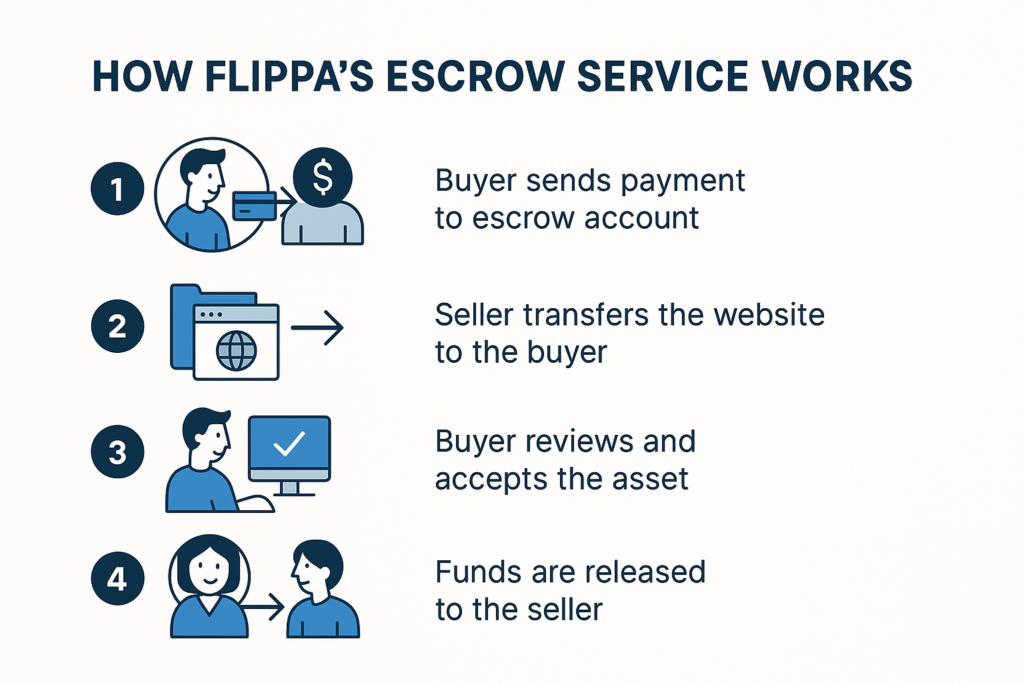
2. Prepare for a Smooth Website Transfer
Once payment is secured, begin the transfer process. This typically includes:
- Domain Transfer: Unlock the domain and provide the authorization (EPP) code for the buyer to transfer it.
- Hosting Transfer: Move the website files to the buyer’s hosting provider or provide full access if hosting is included.
- Login Credentials: Hand over admin access to the CMS (WordPress, Shopify, etc.), analytics tools, and monetization accounts.
1. Domain & Hosting
☑ Transfer domain ownership (via registrar: GoDaddy, Namecheap, etc.)
☑ Provide hosting details or migrate to buyer’s hosting
☑ Share DNS settings and email configurations
2. Website Files & Database
☑ Provide a full backup of website files & database
☑ Transfer access to CMS (WordPress, Shopify, custom platform, etc.)
☑ Hand over FTP/SFTP and cPanel credentials
3. Business Operations
☑ Transfer payment gateway accounts (Stripe, PayPal, etc.)
☑ Hand over third-party integrations (email marketing, analytics, etc.)
☑ Provide supplier or vendor details (for eCommerce sites)
4. Traffic & Marketing Assets
☑ Transfer Google Analytics / Google Search Console access
☑ Hand over SEO assets (backlink list, keyword strategy, etc.)
☑ Provide email list & email marketing platform credentials
☑ Transfer social media accounts (Facebook, Instagram, X, etc.)
5. Monetization & Revenue Streams
☑ Transfer AdSense, affiliate, or subscription-based revenue accounts
☑ Provide reports of past earnings and growth trends
☑ Share advertising campaigns (Google Ads, Facebook Ads)
6. Legal & Branding Assets
☑ Transfer trademarks, copyrights, or registered business names (if applicable)
☑ Provide brand assets (logos, design files, content licenses)
☑ Hand over important contracts or agreements
7. Documentation & Support
☑ Provide a user manual or tutorial for website management
☑ Offer support for a transition period (agreed upon with the buyer)
☑ Share contact details for technical assistance
3. Securely Transfer Digital Assets
Your website may include additional assets that need to be transferred, such as:
- Content (blog posts, images, videos).
- Email lists and customer databases (ensure compliance with privacy laws).
- Third-party integrations (payment gateways, email marketing tools).
Use Google Drive, Dropbox, or a secure file-sharing service to transfer large files safely.
4. Offer Limited Post-Sale Support
Buyers often need help after the sale, so offering a short transition period (e.g., 14-30 days) can build trust and prevent disputes. Support can include:
- Answering questions about the website’s setup.
- Assisting with platform logins or integrations.
- Providing documentation or video tutorials.
Clearly define the support period in your sales agreement to avoid misunderstandings.

5. Confirm the Sale & Get Final Payment Release
Once the buyer confirms they’ve received everything, Flippa’s escrow service will release your payment. Before finalizing, double-check that:
✅ The buyer has full access to the website and domain.
✅ All agreed-upon assets have been transferred.
✅ Both parties are satisfied with the transaction.
Final Thoughts
Ensuring a secure and smooth sale when selling websites on Flippa protects both you and the buyer from potential risks. Using escrow payments, a structured transfer process, and clear communication will help you close the deal with confidence and avoid post-sale issues.
Common Mistakes to Avoid When Selling Websites on Flippa
When selling websites on Flippa, avoiding common mistakes can make the difference between a successful sale and a deal that falls through. Many sellers lose out on potential profits or struggle to attract buyers due to avoidable errors. Here are the most common mistakes and how to prevent them.
1. Overpricing or Underpricing the Website
Setting the wrong price is one of the biggest mistakes sellers make.
- Overpricing can scare away potential buyers.
- Underpricing means leaving money on the table.
Solution: Research similar website sales, use a monthly profit multiplier (20x-40x revenue), and consider getting a Flippa valuation.
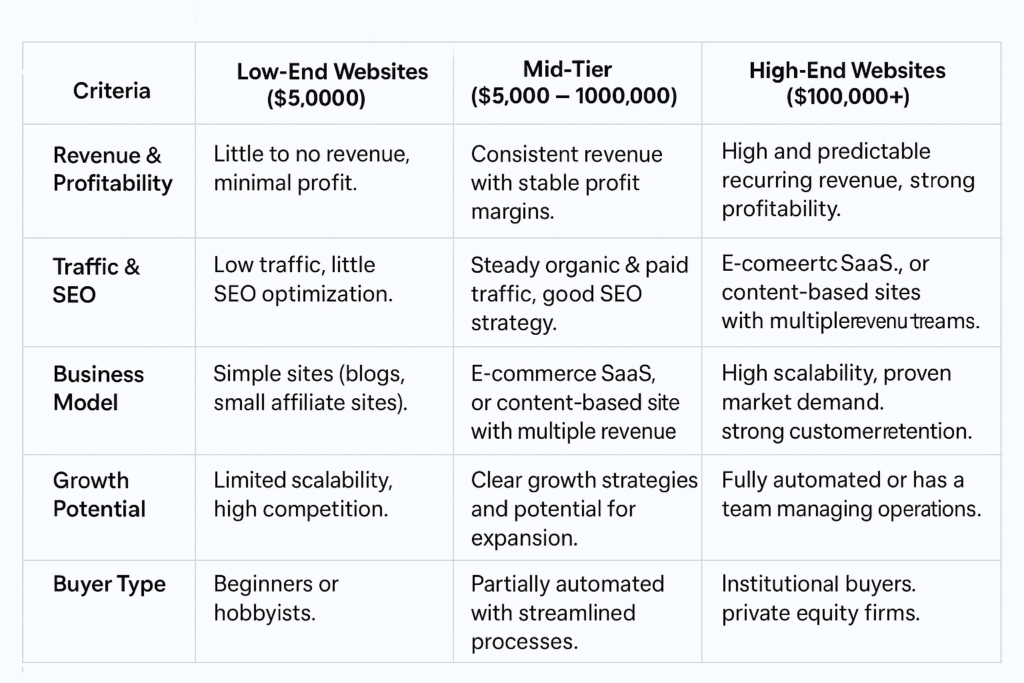
.
2. Not Providing Proof of Traffic and Revenue
Buyers want to see verified data before making an offer.
- Failing to provide Google Analytics screenshots or revenue reports makes your listing look suspicious.
- Incomplete or exaggerated claims reduce buyer trust.
Solution: Link Google Analytics and revenue sources directly to Flippa to give buyers confidence in your listing.
3. Writing a Weak Listing Description
A vague or poorly written description can turn away potential buyers.
- Lack of details about website operations, traffic, and monetization.
- No clear reason for selling, making buyers hesitant.
Solution: Create a detailed, compelling listing highlighting revenue, growth potential, and why the site is valuable.
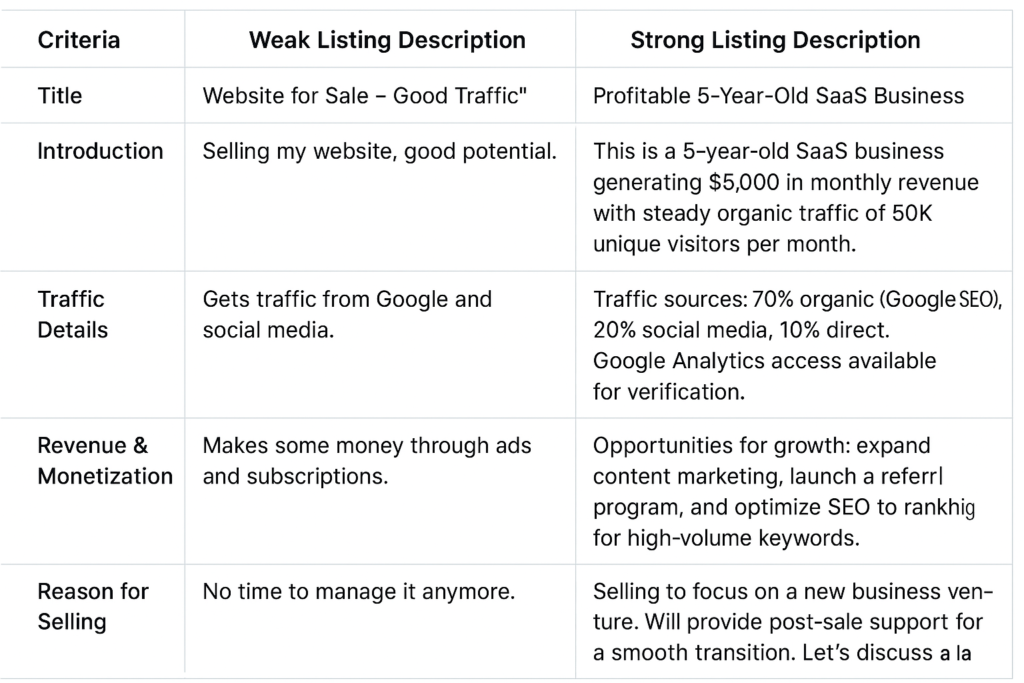
4. Ignoring Buyer Questions and Offers
Lack of communication can lead to lost sales.
- Buyers may ask for more details about revenue, expenses, or operations.
- Delayed responses make buyers lose interest and move on to other listings.
Solution: Respond quickly to inquiries and negotiate professionally to build trust.
5. Skipping Marketing Efforts
Relying solely on Flippa’s marketplace limits your reach.
- Your listing competes with hundreds of others.
- Lack of promotion reduces your chances of attracting serious buyers.
Solution: Promote your listing on LinkedIn, Facebook Groups, Reddit, and website flipping forums to attract more buyers.

6. Not Using Flippa’s Escrow for Payments when selliing websites on Flippa
Accepting direct payments via PayPal or bank transfer increases the risk of fraud.
- Buyers can dispute charges, leaving you without payment.
- Transactions outside Flippa void their seller protection policies.
Solution: Always use Flippa’s escrow service to secure the transaction and protect both parties.
📌 realiser image A step-by-step flowchart showing how Flippa’s escrow system works.
7. Failing to Properly Transfer Assets
If you don’t complete the website transfer efficiently, buyers may become frustrated.
- Delayed domain transfers or missing login details can cause disputes.
- Forgetting to provide content, email lists, or third-party tool access creates unnecessary complications.
Solution: Prepare a website transfer checklist and ensure everything is handed over smoothly.
✅ Website Asset Transfer Checklist
1️⃣ Domain & Hosting
- Transfer domain ownership (GoDaddy, Namecheap, etc.)
- Provide access to hosting account (or assist in migration)
- Share DNS settings and email configurations
2️⃣ Website Files & CMS Access
- Provide full website backup (files & database)
- Transfer access to CMS (WordPress, Shopify, custom platform)
- Hand over FTP/SFTP, cPanel, and admin credentials
3️⃣ Business Operations
- Transfer payment gateway accounts (Stripe, PayPal, etc.)
- Provide access to third-party tools (email marketing, CRM, analytics)
- Share supplier/vendor details (for eCommerce sites)
4️⃣ Traffic & Marketing Assets
- Transfer Google Analytics & Google Search Console access
- Provide SEO assets (backlink list, keyword strategy, content strategy)
- Hand over email list & marketing platform credentials
- Transfer social media accounts (Facebook, Instagram, X, etc.)
5️⃣ Monetization & Revenue Streams
- Transfer AdSense, affiliate, or subscription-based revenue accounts
- Provide revenue reports and past earnings history
- Share advertising campaigns (Google Ads, Facebook Ads)
6️⃣ Legal & Branding Assets
- Transfer trademarks, copyrights, or registered business names
- Provide brand assets (logos, design files, content licenses)
- Hand over important contracts or agreements
7️⃣ Documentation & Support
Share contact details for technical assistance
Provide a user manual or guide for managing the website
Offer post-sale support for an agreed period
Final Thoughts
Avoiding these common mistakes can increase your chances of a smooth and profitable sale when selling websites on Flippa. By pricing your site correctly, verifying your data, writing a strong listing, and using Flippa’s escrow system, you can attract serious buyers and close deals successfully.
Conclusion
Selling websites on Flippa is an excellent opportunity for entrepreneurs looking to monetize their digital assets efficiently. The platform provides various listing options, including auctions and fixed-price sales, allowing sellers to choose the best strategy based on their goals. A well-crafted listing with detailed traffic insights, verified revenue streams, and clear growth potential can significantly enhance a website’s attractiveness to buyers. Additionally, engaging actively with potential buyers, responding to inquiries, and being transparent about business operations can help build trust and lead to a faster and more profitable sale.
By leveraging Flippa’s tools, such as Google Analytics verification and premium listing packages, sellers can boost their chances of securing a successful deal. Whether you are selling a startup, an established eCommerce store, or a profitable SaaS business, optimizing your listing and choosing the right pricing model can make a significant difference. Ultimately, selling websites on Flippa is a strategic process that, when executed properly, can maximize both visibility and profitability in the competitive online marketplace.



